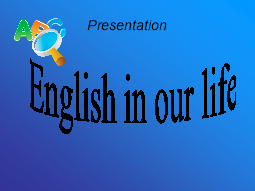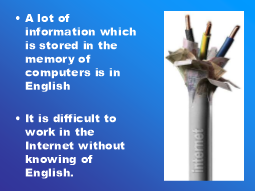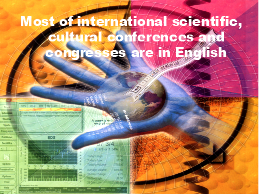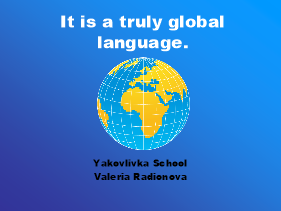Foreign Languages in Our Life
План-конспект уроку з використанням ІКТ
Date: ________________ Form _______10__
Subject: English
Teacher: Teacher’s qualification
Тhe topic of the lesson: Learning Foreign Language
Type of the lesson: Summarized
Equipment: a computer, the internet.
Hand out: task cards, books, magazines, newspapers in the original
Objectives:
Practical: to show an importance of learning foreign languages nowadays; to get pupils to know how to use the existing knowledge; to use speech pattern in oral speech.
Educative: to check on students’ ability to use active vocabulary on the topic in real situations; to teach students to draw conclusions according to the facts.
Developing: to develop a creative way of thinking; to develop students’ speaking, listening, writing and reading skills; to develop their fluency in using the language.
Social: to cultivate students’ interest to learning foreign languages; to stimulate pupils to study English; to wide students’ outlook; to bring up a good attitude to foreign languages.
PROCEDURE
I. Introduction.
1. Greeting.
Teacher: Good morning, dear friends. I’m pleased to see you at our lesson. I hope you are fine and we’ll have wonderful minutes of communication. Are you ready?
2. Warming up. Phonetic drill.
Teacher: Have a warming up activity. Look at the blackboard, read a famous saying and express your own opinion. Do you agree with this statement?
The more we learn the more we know.
The more we know the more we forget.
The more we forget the less we know.
The less we know the less we forget.
The less we forget the more we know.
So why study?
3. Motivation of activity.
Teacher’s speech: Foreign languages are absolutely necessary for people nowadays. More and more people of different professions decide to study foreign languages in order to raise their professional level. Making business nowadays means the ability to speak at least one foreign language. Foreign languages often bring new perspectives in career and private life. Many aspects of our life, like science, entertainment, business, studying became international. Among the most popular foreign languages in Ukraine are English, German, Spanish, French and Italian. About one billion people speak or understand English. English is the language of international communication in many areas of life: trade, tourism and sport. The latest results of scientific investigations are also translated into English. Many books of the best modern writers and poets are translated into English.
II. Main Part.
1. Topic and aims of the lesson.
Teacher: As you have already understood, our today’s topic is “Learning Foreign Languages”
Teacher: I hope, at the end of the lesson you will be able
- to use active vocabulary on the topic, speech patterns in real situations;
- to use the existing knowledge;
- to draw conclusions according to the facts;
- to understand how important is studying foreign languages.
2.Check on homework.
Teacher: During last lessons you have got enough facts to answer the question “Why we learn foreign languages”. Your home task was connected with it. So, what have you done for today?
Pupil: Our home task was to answer the question “Why we learn foreign languages”. Write 5 sentences (I, II level) or prepare a short oral speech (III, IV level).
Some of the pupils read their sentences.
Pupils’ possible answers.
Pupil 1: Nowadays a lot of people learn foreign languages. There exist many reasons why it is necessary to learn foreign languages. Firs of all it is impossible to be an educated person without knowing of foreign languages. Besides foreign languages are of paramount importance for our spiritual development, outlook and self-education. Good knowledge of foreign languages open the way to other cultures and help to understand other people better. As you know, now we live at the age of cooperation and growing international contacts. We successfully develop our economic and cultural cooperation. We establish joint ventures with foreign firms. Certainly we need specialists who know foreign languages well.
Pupil 2: As it has already said we have more opportunities for the international cooperation. It goes without saying that a good knowledge of foreign languages is important. Speaking about foreign languages I’d like to draw your attention to English. I hope you agree that preference is given to English. And no wonder that English is preferable. It is the language of advanced countries, the language of business and cooperation. I must stress English is widely used everywhere. It is the international language. I can’t but say it is widely used in the UNO (United Nations) during congresses, conferences, Olympic Games. I’d like to add it is a mother tongue almost for a billion of people. We can safely say all the civilized world speaks English. It is a truly global language.
Pupil 3: Also mention should be made of the fact that practically about 80 percent of all information which is stored in the memory of computers is in English. I can’t but note that facts about English are astonishing. Most of the cables and telexes in the world are in English. As I have already said English is widely used in the international cooperation. Most of the business deals are carried out in English. I am sure a true businessman must be able to communicate freely. I can’t but mention that through communication satellites English is used for saving people who are in disaster in the sea or in the air.
Pupil 4: I must say the biggest broadcasting corporations transmit their programmes in English. Among them are ABC, NBC, BBC (American/ National/ British Company). Finally it is the voice of Christianity. Millions of copies of “The Bible” published in English bring the word of Greater to every family. We must admit that it is language of great culture which gave the world many famous, well-known and outstanding people in different fields of science and culture. I’d like to mention such English writers as W. Shakespeare, R. Burns, C. Dickens. Without any doubt there are well-known all over the world and enjoy great popularity. As for me, I’d like to read them in the original. But so far it is rather difficult for me. And no wonder as my knowledge leaves much to be desired. I am sure if I work hard I will be able to read them in English.
Pupil 5: I’d like to emphasize, we must take into account that our primary task is the prevention of nuclear catastrophe, fight against AIDS and for better ecological situation. We can eliminate the enemy image in our relations and English will help us to survive. All these facts show tremendous importance of English for the world community. I hope I can convince you that English has no equals and it is worth learning English.
(Additional information to wide pupils’ outlook)
Teacher: I’d like to dwell on the origin of English. More than 2 thousand years ago it did not exist at all. These lands were inhabited by numerous tribes. Some more tribes invaded from the continent. Among them were Vikings, Normans and Romans. They brought their language. As a result of this mixture old English was formed. Later it developed into modern English. That’s why English consists of a number of foreign words. And because of this mixture English pronunciation differs from spelling.
3. Making a Word Map.
Teacher: Now let’s sum up our knowledge. In what areas of life is English widely used?
![]() culture sport trade
culture sport trade
![]()
![]()

![]()
![]() industry tourism
industry tourism
![]()

![]()
science business politics
(Pupil’s presentation)












4. Vocabulary. (Work in group).
Teacher: What professions and jobs do need the knowledge of foreign languages? Let’s make a list of them.
interpreter journalist
businessman secretary
researcher bank worker
diplomat programmer
politician receptionist
stewardess editor
designer
Teacher: Of course we can go on this list to infinity.
5. Writing. (Work in pairs).
Teacher: Now work in pairs. You’re given cards with names of two professions. Make up 2-4 sentences and explain why English is necessary for these jobs.
(Pupils read their sentences)
6. Listening (Watching video).
Pre-listening activity
Teacher: Now watch an episode from a film “The Devil Wears Prada”. A young girl is looking for a job. You’ll see it in the original without translation.
While-listening activity
Teacher: While listening try to take notes and find out the answers to the following questions:
What is girl’s full name?
What job would she like to get?
What are her personal qualities?
Post-listening activity
Teacher: You’ve got a sheet of paper with tasks you should do. Look at it, please. The first task: a multiple choice test. Choose the correct answer. The second one: read the statements and agree or disagree. Write in brackets true or false are them. The third task: complete the sentences according to the text.
Handout
The Devil Wears Prada
I. Choose the correct answer.
1. The episode is about:
a) sport;
b) trying to get a job;
c) animals.
2. The main hero of this episode is:
a) a young girl;
b)a dog;
c) an old man with a kitten.
3. At the end of the episode a young girl thanked for:
a) money;
b) time;
c) food.
II. Read the statements and agree or disagree. Write in brackets true or false are them.
- The girl’s name is Amanda Woods.
- She tries to get a job in a fashion magazine.
- She wants to be a designer.
- According to the girl’s words she’s smart and hard-working.
III. Complete the sentences according to the text.
- My name is _______________________________________________.
- I think I could do a good job as your ___________________________.
- I’m not skinny or ______________ and I don’t know much about ____________.
- But I’m _________________ I learn fast and I’ll work very hard.
- Thank you for your ________________________.
KEYS:
- 1) b; 2) a; 3) b.
- 1) F; 2) T; 3) F; 4) T.
- 1) Andy Sachs; 2) assistant; 3) glamorous, fashion; 4) smart; 5) time.
III. Ending the lesson.
1. Summing up.
Teacher: Our lesson is coming up to the end. And I hope now you can safely say why we should learn foreign languages.
Pupils: to be an educated person;
- to make friend abroad;
- to wide outlook;
- to open new horizons;
- to get a better job;
- to read books and watch films in the original;
- to rise our professional level;
- to make business.
2. Home assignment.
Teacher: At home read texts from the original literature, translate and retell them. Is it clear? Open your dairies and write down your home task.
3. Evaluation.
Teacher: You worked well during the lesson. It was pleasure to teach you. Thank you. Open your mark books. I’m going to put down the marks.
4. Parting.
Teacher: The lesson is over. See you next lesson. Good bye.


про публікацію авторської розробки
Додати розробку
